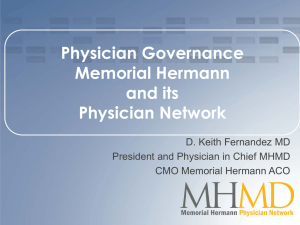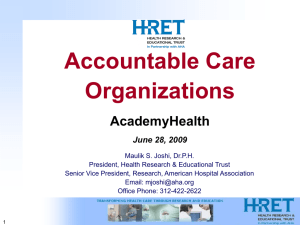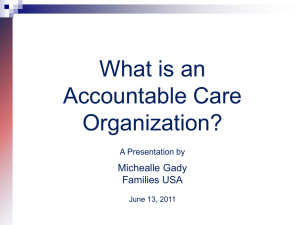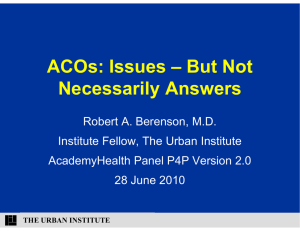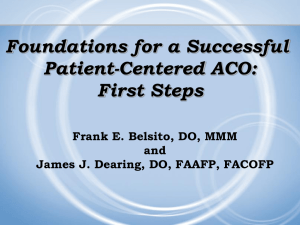Dr. Shawn Griffin
advertisement
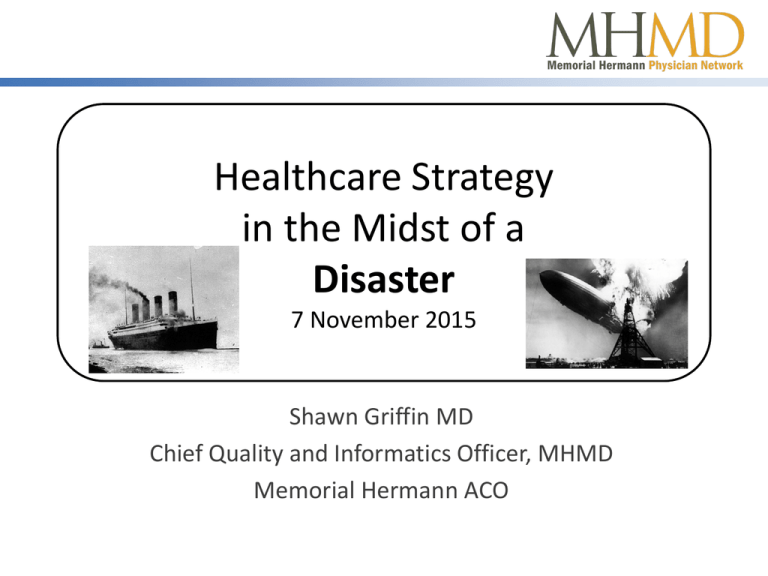
Healthcare Strategy in the Midst of a Disaster 7 November 2015 Shawn Griffin MD Chief Quality and Informatics Officer, MHMD Memorial Hermann ACO Agenda • • • • • Overview Trust Engagement/Initiatives Data/Infrastructure Performance OVERVIEW 3 Memorial Hermann Second Largest Non-Profit in Texas 6,000 practicing physicians Partnership with the University of Texas Health Science Center of Houston 9 Acute Hospitals, 3 Heart & Vascular Institutes Dedicated Children’s & Rehabilitation Hospitals 98 Outpatient Sites: Ambulatory Surgery, Imaging, Sports Medicine, Lab Sports Medicine, Neuroscience, Transplant COE’s The nation’s busiest trauma program 4 MHHS National Safety and Quality Leadership 15 Top Health Systems; Top 5 Large Health Systems (2012,2013) Healthcare’s “100 Most Wired” 7th consecutive year National Patient Safety Texas Hospital Association Leadership Award, Joint Commission-NQF Bill Aston Quality Award Sponsored by VHA National Quality Forum John M. Eisenberg (2011) Foundation & the National Quality National Patient Safety National Business Healthcare Award (2009) & Quality Award (2012) Group on Health (2009) America‘s #1 Quality Hospital for Overall Care (2011 & 2012) HealthGrades® America’s 50 Best Hospitals (2010, 2011 & 2012) Distinguished Hospital for Clinical Excellence (2011) 2011 Texas Healthcare Foundation Quality Improvement Awards (9 Memorial Hermann Campuses) Memorial Hermann Physicians MHMD 3500 practicing physicians 2000 Clinically Integrated 1850 CI physicians in MHACO 300 Advanced Primary Care Practices (PCMH) 250 additional PCPs Evolving High Performance Specialty Physicians (250-500) 150 are employed (MHMG) University of Texas Physicians 800 physicians CI and ACO affiliates Some UT participate in advanced and high performance practices 6 National Trends • Price Pressures Increasing • Health Systems Expanding Into Growing Markets • Payer, System, and Group Consolidation Changing Existing Relationships • Accountable Care Organizations Growing, but Not All Systems Buying In • For-Profit Investors Flowing Into Healthcare • Every Provider’s Role is Changing Why Should Medicine Change? Hurricane Mitch 1998 Honduras 14,800 deaths 8 Why Should Medicine Change? Choluteca Bridge, Honduras 9 OLD MODEL 10 US Health Care “System” US Health Care “System” • Unsafe: “Public Health Hazard #8” • Unreliable: Only 55% receive scientifically indicated care • Uncoordinated: No reliable outcome produced • Inequitable: Race predicts health status, underinsurance causes harm • Inefficient: Costs are 2X other countries, 30% waste, supply-driven care 11 US Health Care “System” Health System = Payment System • Designed as a payment system and works well for that: pay for doing has produced a lot of doing • Not designed as a system for producing or maintaining healthy people 12 We Cost Too Much 8,000 Average spending on health per capita United States Canada Germany France Australia United Kingdom 7,000 6,000 5,000 4,000 3,000 2,000 • In 2010 we spent $2.6 trillion on health care, or $8,402 per person. • The share of economic activity (GDP) devoted to health care has increased from 7.2% in 1970 to 17.9% in 2009 and 2010. • Health care costs per capita have grown an average 2.4 % faster than the GDP since 1970. • Half of health care spending is used to treat just 5% of the population. 1,000 2008 2006 2004 2002 2000 1998 1996 1994 1992 1990 1988 1986 1984 1982 1980 0 Source: Commonwealth Fund National Scorecard on U.S. Health System Performance, 2011. 13 STRATEGIC HEALTH PERSPECTIVES℠ Cost Too Much, But Don’t “Get” Too Much Quality* Value = _____________ Cost *Denis Cortese, MD, former Mayo Clinic president and CEO (Quality=Outcomes, Safety, Service ) Graph: OECD (2011), Health at a Glance 2011: OECD Indicators, OECD Publishing. 15 16 Provider Shortage – Shrinking supply of physicians. • One in three practicing physicians in the U.S. is over the age of 65 and close to retirement. – Physician shortages will impact primary care more than other specialties. • 52,000 more primary care physicians needed by 2025. • 33,000 additional physicians will be needed in the next 10 years due to population growth alone • 20 percent of Americans older than 65 see 14 or more physicians and average 40 physician visits each year. – A significant shortage of surgeons and oncologists is anticipated. – Medical residencies are in short supply 17 Physicians are Changing Nearly a quarter of physicians regret their career choice and over a third are unlikely to encourage young people to enter the field. 18 Physician Shortage • How to fix the shortage: – Don’t increase the upper end of the provider pyramid (specialists)! – Provide high quality and low cost care when, where and how it is desired by the consumer! – Increase the number, locations and methods of Primary Care! – Change the model of care! 19 TRANSITION TO NEW MODEL 20 Memorial Hermann Health System 21 IHI “Triple Aim” Institute for Healthcare Improvement’s (IHI’s) ‘Triple Aim’ 1. Best patient experience 2. Lower cost 3. Better health for populations To achieve this, new methods must be used. 22 How will we get there? Building our Team Education Aligned Incentives Organizational Structure Commitment to Evidence Based Medicine Information Management 23 We Started Many Years Ago… 5 Key Strategic Inflection Points Clinical Programs Committees (CPCs) (2000) Clinical Integration (2005) The Physician Compact (2008) The Patient-Centered Medical Home (PCMH)(2011) The Accountable Care Organization (ACO) and Single Signature (2012) 24 Organization Timeline 2000 2001 2002 2003 2004 2005 2006 2007 2008 2009 2010 2011 2012 2013 2014 CPCs CPCs Order Sets FTC Consent Order Crimson Development Clinical Integration Discovery of CI Commitment to eCW PQRI reporting Compact CQIO, MHealth CI Contract CI Bonus $ Order Set Delegation PCMH CPC Restructure, IPA Partnership POC, APCP Contracts CI Bonus $ MHMD Care Management IPQS Data Analyst, Humana CI Contract MH ACO Board Restructure, MSSP ACO CPRM, NCQA Certifications Aetna ACO Contract CI Bonus $ BCBS ACO Contract Pediatric APP Contracts Network Management Region Meetings Supportive Medicine Strategic Analytics, ScheduleNow CI Bonus $ ACO Service Line Projects Referral Center, Life In Balance DocbookMD MSSP Bonus$ Authority of the CPCs Delegation from the health system Protocols (creating and measuring EBM practices and order set templates) Performance (setting and monitoring progress against established quality standards and protocols) Products (drives the standardization of vendors, formularies, supply chain decisions) Payment (Pay for performance goals, co-management agreements, ACO project metrics, PCMH elements) Projects (ED to ED transfer policy, CT scanning in pediatric head trauma, standardized order sets in Observation units, service line, credentialing and privileging standards) Program Rationalization (Consolidation and concentration of clinical service delivery – i.e. open heart and joint programs) 26 Establishing Infrastructure System Quality Board MHMD Board CPC Pathology Radiology Medicine Trauma Evidence Based Med Emergency Surgery CEPC Critical Care MIC General Surgery Bariatrics Nephrology AMIC ENT NSQIP Heme/Onc Editorial Robotics Anesthesia Allergy EQC Hospital Documentation Gastro Infectious Disease PM&R PSH Supportive Medicine Pediatrics (APPs) Peer Review Orthopedics Vendor TF CardioVascular services Primary Care (APCPs) Women and Children Cardiology Neonatology CV Surgery Ob/Gyn Pain Clinic VTE Diabetes Trauma 27 Iatrogenic Pneumothorax MH Southeast hospital MH Southeast Hospital Ultrasound Mandatory 514 CPC Recommendations in 2014 20 Months Zero Iatrogenic Pneumothorax Outcomes Clinical Integration (2005) Participating physicians must participate Selecting quality measures Reporting performance Determining performance targets (setting realistic goals) Participate in committee work, performance feedback, and quality improvement activities • Time, effort and IT infrastructure all required • • • • Those who do not participate even after remediation, must be removed! The MHMD Compact (2008) MHMD agrees to: Maintain primary loyalty to physicians Negotiate well to align incentives Include physicians in work and decision making Provide clear and timely information • Membership Criteria, Quality Measure Scoring • Accountability / Improvement Process • Contract, Financial Performance Provide physicians with information, services, and education to ensure high quality and ease practice burdens Seek feedback from its physicians Maintain confidentiality Communicate, communicate, communicate Make meetings worthwhile and engaging Create leadership training programs 31 The MHMD Compact Physicians agree to: Practice evidence-based medicine Uphold regulatory, quality, and safety goals Report quality data Meet CI criteria Come to meetings and performance feedback sessions Pay attention to information from MHMD Accept decisions by physicians in MHMD committee settings Be flexible, share ideas Collaborate with colleagues and hospitals Behave as professionals 32 ENGAGEMENT/INITIATIVES 33 BUT WHAT WAS MISSING IN THESE EFFORTS? WHAT ABOUT OUTPATIENT? 34 The Patient-Centered Medical Home (2011) Quality Innovation Technology UC/AH Retail Clinics Care Mgmt Disease Mgmt Health Coaches Preventive Care Data Discounts Liability Ins Group Purchasing Single Signature Contracts Gap Reports At Risk/High Risk Physician Report Cards Pt Engagement Patient Education Physician Training HCC Documentation ICD-10 CMEs MU University Physician University Patient Access Patient Portal Supp Medicine Post Acute Ambulatory ICU Claims Files EMR data Lab Rx Practice Transformation EMR Point of Care NCQA Practice Assessment GNE Program Clinical Integration | Accountable Care Organization Informed Physician Better Care Great Experience Primary Care Network >350 Adult & Pedi Physicians North Region Northeast Region 60 APCPs Region Leader – Dr. Ken Davis 27 APCPs Region Leader – Dr. Tejas Mehta West Region 70 APCPs Central Region Region Leaders – Dr. Ankur Doshi & Dr. David Reininger 56 APCPs Region Leader – Dr. Kevin Giglio SW Region 76 APCPs Region Leader – Dr. John Vanderzyl Southeast Region 48 APCPs Region Leaders – Dr. Maqsood Javed & Dr. Adnan Rafiq 36 Putting Inpatient and Outpatient performance together when caring for whole populations… WHAT DID WE LEARN ABOUT OUR PERFORMANCE AS A COST & QUALITY PROVIDER? 37 Favorable Performance Metrics Commercial Data MHMD is more efficient than the market Inpatient Days/ 1000 208 13% better 236 Average length of stay 3.5 11% better 3.9 Re-admission rates 5.1% 6.0% ER visits / 1000 164 8% better 180 Memorial Hermann 18% better Houston market 38 Along Came Health Reform by any other Name…. Accountable Care Organizations Affordable Care Act / Obamacare Population Health Clinical Integration Patient Centered Medical Homes And the ability to apply to become an Official Medicare Shared Savings Program ACO participant 39 Memorial Hermann ACO (2012) System VAP Do No Harm Ventilator Associated Pneumonia VAPs Rate per 1K Vent Days 6.00 4.00 UCL = 3.50 UCL = 2.88 = 2.46 UCLUCL = 2.44 Mean = 2.04 2.00 Mean = 1.23 Mean = 0.95 LCL = 0.58 Mean = 0.64 2 tr Q 3 tr 4 tr Q 4 tr 1 Q 3 tr 2011 Q 2 tr Q 1 tr Q tr Q 3 4 tr 2010 Q 2 tr Q 1 4 tr tr Q Q 3 tr 2009 Q 2 tr Q 1 4 tr tr Q Q 3 tr Q 2008 Q 2 tr 1 tr Q Q 4 tr tr Q 2007 Q 2 3 tr 1 tr Q Q 4 tr 3 tr Q 2006 Generated: 1/30/2013 12:18:11 PM Source file date: 1/30/2013 Q 2 tr tr Q Q Q tr 1 0.00 2012 Reporting Months produce d by Sys te m Qua lity a nd Pa tie nt Sa f 40 What Does an ACO Mean? Allowed for collaborative aligned incentives programs between hospital and physicians Relaxed fraud and abuse restrictions Provided for safe harbors Provided exclusive single signature capabilities 41 MSSP ACO Growth MSSP ACO's 800 700 600 500 400 MSSP ACO's 300 200 100 0 Q1 2011 Q1 2012 Q1 2013 Q1 2014 Q1 2015 42 MSSP National Coverage 43 AND THE PAYERS RESPONDED TO OUR MODEL 44 Covered Lives (2015) BCBS (90,000)* 370,000+ Covered Lives United (45,000)* Aetna Whole Health (ACO) (26,000) Aetna Commercial (85,000) Aetna Medicare Advantage (5,800) United Medicare Advantage (8,800) CMS MSSP (ACO) (45,000+) Humana Medicare Advantage (5,000) Humana Commercial (18,700) Health Solutions Commercial (45,000+) *estimated. 45 Evolution of Partnerships PAYERS Health Plans MHMD Physicians MHHS Hospitals MANAGING DATA / INFRASTRUCTURE 47 How to Manage Data • Managing a population requires: – Defining the population – Joining data together from different sources (in real-time, ideally) – Pushing the information back out to users – Changing behaviors based upon the information 48 We’re Not Asking Much… Population health platform Key metrics • • • • Claims analytics • PMPM / cost analysis • Risk stratification (MARA) • Utilization analysis • In Network/out of network analysis • Member demographics analysis • Generic drug dispense analysis • Readmissions claims analytics Example Metrics Quality performance analytics Value-based payer reporting Dimensions / Data drill-in • All population, payer/plan, region, practice, provider, CI-APCP, CI-APP & member Attributed population Member months Risk-adjusted PMPM – Total Risk-adjusted PMPM – Medical Risk-adjusted PMPM – Rx Risk-adjusted PMPM – Inpatient Risk-adjusted PMPM – Outpatient Risk scores – concurrent & prospective PMPM (Real) Generic drug utilization High-cost imaging/1000 Admits/1000 ED/1000 Inpatient days/1000 ED unique members/1000 # of unique members with admit # of unique members with ED visit OP visit/1000 30-day readmits (no exclusions) ED/IP/OP counts CT scans/MRI counts Registries 230 standard measures Registries and measures Network utilization: Total in/out Contract metric scorecard DID IT WORK? ARE WE MANAGING COST & IMPROVING QUALITY? 55 PERFORMANCE 56 Efficiency Metrics Clinical Economics Improved Impactable Admits /1,000 27.1% lower Impactable Medical Admits /1,000 26.6% lower Impactable Surgical Admits /1,000 28.3% lower Impactable Medical Bed Days /1,000 47.0% lower Impactable Surgical Bed Days /1,000 5.7% lower High -Tech Radiology Visits /1,000 42.4% lower CT Scans and MRIs /1,000 47.8% lower 0 ACO Network, YOY performance 50 100 150 200 57 Clinical Quality Improved 100% 90% 80% 70% 60% 50% 40% 30% 20% 10% 0% Asthma: Use Breast cancer Cervical of screening cancer appropriate screening medications Colorectal cancer screening Aetna National Average Diabetes: Diabetes: Lipid profile Hemoglobin A1c testing 2014 MHMD Performance Better Cost and Quality for Employers Global Engineering and Construction Co. supporting Energy, O&G industry Medical Costs 15% lower Target Actual Enrollment 2014 20% increase 2015 Efficiency Results TARGET RESULT DELTA “Impactable” Medical Admissions/1,000 55.0 16.7 69.6% Potentially Avoidable ER Visits/1,000 95.4 65.7 31.1% High Tech Radiology Visits/1,000 170.3 149.0 12.5% CT Scans and MRIs/1,000 66.3 60.5 8.7% 59 BEST IN THE COUNTRY MSSP PERFORMANCE 60 MSSP Performance Year 1 (18mo) MSSP ACO State Total Savings ACO Share TX $57.83 M $28.34 M FL $39.57 M $19.34 M NY $27.92 M $13.68 M MI $24.68 M $12.09 M RGV ACO Health Providers, LLC TX $20.24 M $11.90 M ProHEALTH Accountable Care Medical Group, PLLC NY $21.91 M $10.74 M Triad Healthcare Network, LLC NC $21.51 M $10.54 M WellStar Health Network, LLC GA $19.88 M $9.74 M Accountable Care Coalition of Texas, Inc. TX $19.10 M $9.36 M Memorial Hermann Accountable Care Organization Palm Beach Accountable Care Organization, LLC Catholic Medical PartnersAccountable Care IPA, Inc. Southeast Michigan Accountable Care, Inc. 61 MSSP Performance Year 2 (12mo) MSSP ACO State Total Savings ACO Share TX $52.93M $22.72M FL $32.17M $14.46M MI $27.07M $12.08M Oakwood ACO, LLC MI $19.07M $8.15M Millennium ACO FL $17.49M $7.98M ProHEALTH Accountable Care Medical Group, PLLC NY $17.15M $8.02M Allcare Options, LLC FL $16.99M $6.06M Qualuable Medical Professionals, LLC VA, TN $16.62M $7.41M Accountable Care Coalition of Texas, Inc. TX $16.04M $6.34M Memorial Hermann Accountable Care Organization Palm Beach Accountable Care Organization, LLC Physician Organization of Michigan ACO 62 Final Thoughts • The new method of healthcare involves new partners and new ways to practice. • Teams will be larger than ever. • People expect more than ever from us. • More information than ever. • There has never been a better time to work together - differently. 63 QUESTIONS 64
